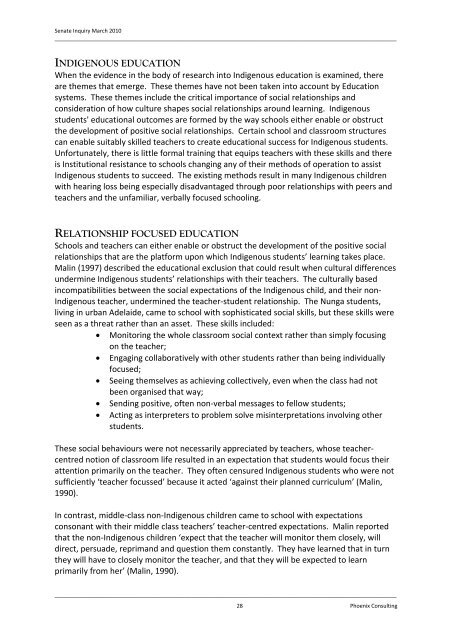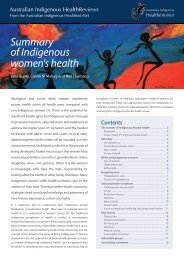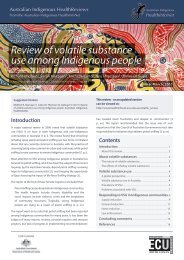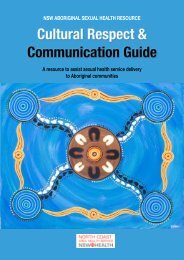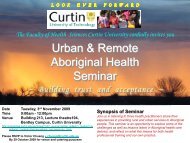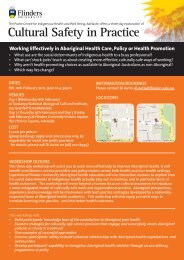hearing loss and the criminal justice system - Australian Indigenous ...
hearing loss and the criminal justice system - Australian Indigenous ...
hearing loss and the criminal justice system - Australian Indigenous ...
Create successful ePaper yourself
Turn your PDF publications into a flip-book with our unique Google optimized e-Paper software.
Senate Inquiry March 2010_________________________________________________________________________________________________________________INDIGENOUS EDUCATIONWhen <strong>the</strong> evidence in <strong>the</strong> body of research into <strong>Indigenous</strong> education is examined, <strong>the</strong>reare <strong>the</strong>mes that emerge. These <strong>the</strong>mes have not been taken into account by Education<strong>system</strong>s. These <strong>the</strong>mes include <strong>the</strong> critical importance of social relationships <strong>and</strong>consideration of how culture shapes social relationships around learning. <strong>Indigenous</strong>students' educational outcomes are formed by <strong>the</strong> way schools ei<strong>the</strong>r enable or obstruct<strong>the</strong> development of positive social relationships. Certain school <strong>and</strong> classroom structurescan enable suitably skilled teachers to create educational success for <strong>Indigenous</strong> students.Unfortunately, <strong>the</strong>re is little formal training that equips teachers with <strong>the</strong>se skills <strong>and</strong> <strong>the</strong>reis Institutional resistance to schools changing any of <strong>the</strong>ir methods of operation to assist<strong>Indigenous</strong> students to succeed. The existing methods result in many <strong>Indigenous</strong> childrenwith <strong>hearing</strong> <strong>loss</strong> being especially disadvantaged through poor relationships with peers <strong>and</strong>teachers <strong>and</strong> <strong>the</strong> unfamiliar, verbally focused schooling.RELATIONSHIP FOCUSED EDUCATIONSchools <strong>and</strong> teachers can ei<strong>the</strong>r enable or obstruct <strong>the</strong> development of <strong>the</strong> positive socialrelationships that are <strong>the</strong> platform upon which <strong>Indigenous</strong> students’ learning takes place.Malin (1997) described <strong>the</strong> educational exclusion that could result when cultural differencesundermine <strong>Indigenous</strong> students’ relationships with <strong>the</strong>ir teachers. The culturally basedincompatibilities between <strong>the</strong> social expectations of <strong>the</strong> <strong>Indigenous</strong> child, <strong>and</strong> <strong>the</strong>ir non‐<strong>Indigenous</strong> teacher, undermined <strong>the</strong> teacher‐student relationship. The Nunga students,living in urban Adelaide, came to school with sophisticated social skills, but <strong>the</strong>se skills wereseen as a threat ra<strong>the</strong>r than an asset. These skills included: Monitoring <strong>the</strong> whole classroom social context ra<strong>the</strong>r than simply focusingon <strong>the</strong> teacher; Engaging collaboratively with o<strong>the</strong>r students ra<strong>the</strong>r than being individuallyfocused; Seeing <strong>the</strong>mselves as achieving collectively, even when <strong>the</strong> class had notbeen organised that way; Sending positive, often non‐verbal messages to fellow students; Acting as interpreters to problem solve misinterpretations involving o<strong>the</strong>rstudents.These social behaviours were not necessarily appreciated by teachers, whose teachercentrednotion of classroom life resulted in an expectation that students would focus <strong>the</strong>irattention primarily on <strong>the</strong> teacher. They often censured <strong>Indigenous</strong> students who were notsufficiently ‘teacher focussed’ because it acted ‘against <strong>the</strong>ir planned curriculum’ (Malin,1990).In contrast, middle‐class non‐<strong>Indigenous</strong> children came to school with expectationsconsonant with <strong>the</strong>ir middle class teachers’ teacher‐centred expectations. Malin reportedthat <strong>the</strong> non‐<strong>Indigenous</strong> children ‘expect that <strong>the</strong> teacher will monitor <strong>the</strong>m closely, willdirect, persuade, reprim<strong>and</strong> <strong>and</strong> question <strong>the</strong>m constantly. They have learned that in turn<strong>the</strong>y will have to closely monitor <strong>the</strong> teacher, <strong>and</strong> that <strong>the</strong>y will be expected to learnprimarily from her’ (Malin, 1990)._________________________________________________________________________________________________________________28 Phoenix Consulting


